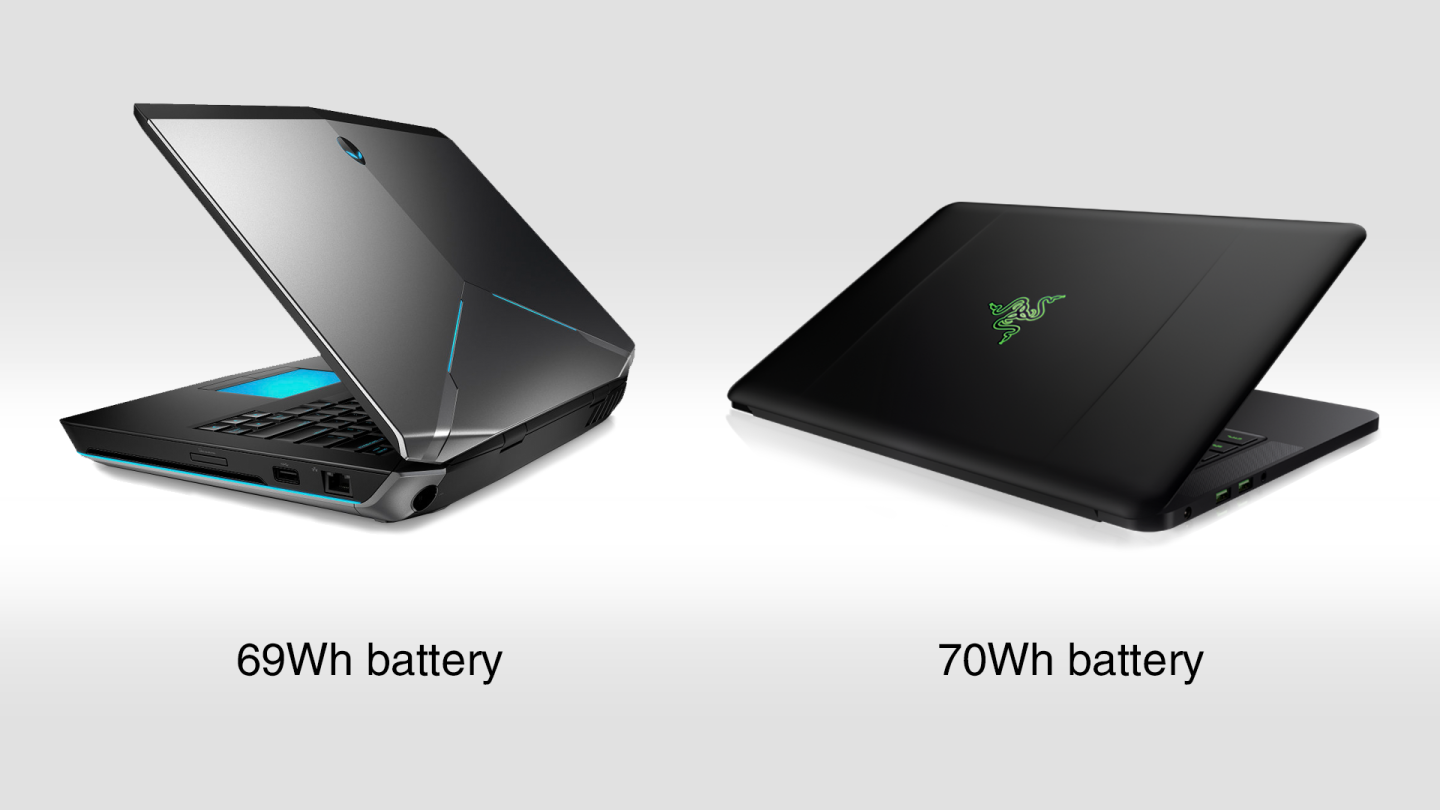The Alienware 14 and Razer Blade provide two distinct visions of what a 14-inch gaming laptop should be. The former provides a classic portable gaming experience, while the latter breaks the mold, offering strong performance in a thin and light package. Read on as we compare the two machines, in an effort to determine which system is more deserving of your attention.
Display

The Dell product takes an early lead here, besting the Razer Blade's 1600 x 900 display with its full HD 1920 x 1080 offering.
Processor

Though both systems feature Q2 2013 quad-core Intel CPUs, the Alienware 14's Core i7 4900MQ is the better option, with a higher clock speed and larger smart cache. That said, both processors are capable options.
As with many of these categories, Dell offers a variety of CPU configurations. The Core i7 4900MQ is featured on the higher-end configuration under discussion here.
Graphics

Both laptops are fitted with NVIDIA GeForce GTX 765M graphics cards.
RAM

Yet another category where the Alienware trumps its rival, featuring double the memory of Razer's product.
Storage

While the Alienware system offers more storage capacity, and its 80GB SSD drive will help make the system fast and responsive, the Razer's solid state-only setup is the better option. SSD storage is faster, quieter and more durable.
Razer offers 128, 256 and 512GB SSD configurations with the Blade, we've opted for the larger capacity drive for this comparison.
Ports

When it comes to connectivity, Alienware is the clear winner, offering a plethora of ports including Gigabit Ethernet, Mini DisplayPort and a Kensington Security Lock port. Both systems offer and HDMI out and three USB 3.0 ports.
Battery life

Though both systems offer similar capacity batteries, the Razer squeezes significantly more runtime out of its setup. According to Engadget" target="_blank">Engadget
, you can expect just three hours charge from the Alienware, while the Razer will run for more than six hours on a single charge.That said, longevity isn't a primary concern when it comes to gaming laptops. If you're planning on playing GPU-intensive, battery-draining AAA titles, then you'll likely want to be plugged into the wall anyway.
OS and disk drive

The Razer comes with Windows 8.1 as standard, while Alienware offer both that and a Windows 7 option. The Alienware 14's Blu-ray reader is the clear winner if you're still fond of physical media. You'll have to rely on downloads if you opt for the Blade, with Razer's product doing away with the optical drive entirely.
Dimensions and design

This category sees one of the most striking differences between the two machines. While the Alienware 14 espouses the bulky, weighty form factor we've come to expect of portable gaming machines, the Blade takes an entirely different approach. Almost an inch thinner than its competitor, and around two-thirds as weighty, you might actually consider using Razer's system on your lap.
The smaller system features a slick MacBook Pro-like design, with only the green Razer logo on the lid revealing the gaming-orientated nature of the machine. The design of the Dell machine is far less understated than its rival, exhibiting classic over-the-top Alienware styling.
The rest

A few other things set the two systems apart. The Alienware's keyboard features four separate, programmable backlit areas, as well as AlienFX lighting throughout the chassis. The Razer is, once again, a little more reserved, offering a backlit keyboard and useful Synapse 2.0 software that syncs users' peripherals preferences to the cloud.
The Alienware wins out when it comes to webcam quality, with its 2MP offering trumping the Razer's 1.3MP camera.
Price

At the time of writing, and in these configurations, the Alienware 14 comes in around US$100 less than the Razer Blade.
Wrap-up
With these systems, Dell and Razer have provided two distinct visions of what a gaming laptop should be. The Alienware 14 is a more traditional gaming machine – it's thick, heavy, offers great performance and a plethora of ports. The Razer Blade takes a different approach, cutting down on the extras and delivering competitive specs (particularly its SSD hard drive) and great battery life in an impressively thin and light form factor.
When it comes to raw power, the Alienware machine wins out, with double the RAM and a more powerful CPU than its competitor. The system's display also boasts a superior resolution, and while 14 inches is small for a gaming laptop, the Razer's lack of full HD screen is a shame considering the lofty price tag.
The two laptops offer different approaches to gaming on the move, and your decision here should be based on what you're looking for from the machine.
If your priorities are genuine portability and stylish looks, and if you can do without a disk drive, then the Razer Blade may well fit the bill. If you're looking for a versatile and powerful machine and are a fan of the loud looks, then the Alienware 14 is a good way to go.
These are just two examples of 14-inch gaming laptops, albeit two very solid examples. Other systems like the Gigabyte P34G, or even a cheaper configuration of the Alienware 14, offer good performance at a lower price point. It's also worth looking at custom PC manufacturers such as PC Specialist (based in the UK). You can often get more for your money going down this route, but you're unlikely to get quite the same bells-and-whistles design as you do with major manufacturers.















